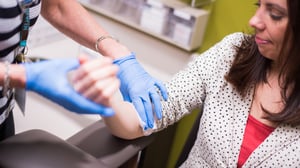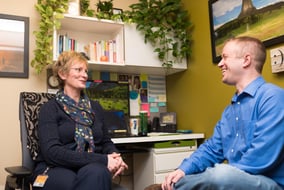This past year has been especially hard on many of us within the healthcare industry. And while the effects of chronic stress and burnout were hot topics long before now, our current public health crisis has brought new urgency to the conversation.
Indeed, a Medscape study found that nearly half — 42% — of physicians across 29 specialties reported feeling burned out in 2020. The overwhelming majority — 79% — said their burnout started pre-pandemic.
Fortunately, we’ve found a useful tool that can make a significant difference: mindfulness. Mindfulness can, in small ways, keep you focused and sane throughout the day, helping to stave off burnout, even in the most challenging of times.
Burnout: recognize the symptoms
Think of burnout as a slow-burning match. Or a gas tank that’s slowly being depleted. You might not realize that you’re experiencing burnout at first because you’re still able to do your work and take care of others.

But at some point, the match burns all the way out.
Or your gas tank, which was already running near empty, finally runs out.
We encourage you to pause and consider your mental health and needs before you reach that point. To do that, you need to learn to recognize the symptoms of burnout.
There are three main ways the emotional exhaustion inherent to burnout manifests itself:
| Physical changes — We hold a lot of our stress and emotions in our bodies, which is expressed via muscular tension. Are your neck and shoulders stiffer? What about your hips? Pay careful attention to changes in your ability to move. |
| Depersonalization — The healthcare career paths tend to attract empathetic and compassionate people. But burnout twists those emotions, depleting us of the things that connect us to our humanity. Sarcasm and cynicism may start to creep into your thoughts and speech patterns. |
| A decreased sense of purpose — Feeling adrift, like you’re not accomplishing anything or making a difference can be a sign that you’re starting to burn out |
What is mindfulness and how can it help?
At Vera, we define mindfulness as kindly attending to the present moment — and doing so in a non-judgmental way.
That’s easier said than done, of course. But the objective is to accept your thoughts, actions, the situation at hand, and so on, without putting a value on them or labeling them as good or bad. Things are as they are.
What that does is give us the opportunity to recognize what is happening and choose how to respond instead of letting our fight-or-flight response to stress take over. By practicing mindfulness, we can start to counteract the depletion of our mental, emotional, and physical reserves and mitigate the risk of total burnout.
How to practice mindfulness in a healthcare setting

For many, the phrase “practicing mindfulness” brings to mind images of closing your eyes and meditating for 20 minutes. But while many professionals have found that helpful, taking that much time out of the day can also seem overwhelming when you have patients to see and take care of. Instead, we recommend taking three simple steps to relax your nervous system:
- Stop
- Breathe
- Observe
You can do these three steps at any point in the day, and you only need to take a few short seconds at a time. Here are a few simple tweaks you can make to your routine that take no time at all:
- Before walking in to see a patient, pause briefly at the door, take a deep breath, and bring your focus to your breathing and that moment in time.
- Before a Zoom meeting, especially if you’ve had several meetings back-to-back, stand up, roll your shoulders back, and breathe deeply for a few seconds before settling in for the call.
- Incorporate a quick two-minute mindfulness exercise into sessions with your patients. It promotes their well-being too.
Mindfulness in healthcare settings doesn’t have to be elaborate or time-consuming. Small actions taken throughout the day to center yourself and shake off that flight-or-fight response to stress can make a huge difference. And when done consistently, they can help promote a more balanced, positive outlook on life, mitigating the risk that you’ll suddenly find yourself on the verge of burning out.
We know that you give your all to your patients, day in and day out, so that you can guide them to better health. But it’s also important to remember: you need to take care of yourself in order to take care of others effectively. Practicing mindfulness and other small acts of self-care will not just benefit you; it will benefit your patients too.
If you’re interested in deepening the connection you’ve developed with your patients, we have plenty of strategies that we’re confident can help. Learn about the different ways you can build trust with your patients and ensure they receive the care they need by checking out our guide to Empathetic Listening: The Key To Unlocking Better Care And Better Health Outcomes.
Sign up
Join our email list to receive the latest open positions, Vera Careers news, and more.





